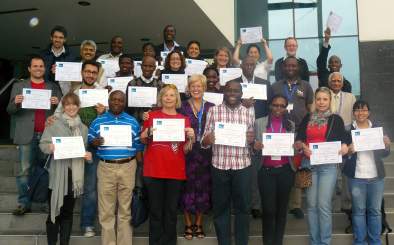The Workshop attracted a total of 65 delegates from 29 countries, and the eight GWP – University of Dundee Scholars were able to join with them to examine the functions of international water law, how it promotes regional peace and security, and how it reconciles competing claims over transboundary freshwaters. Amongst other key questions explored were how international legal frameworks support national decision making, and what diplomatic strategies nation states can employ to secure the best legal outcomes possible in light of their transboundary water interests.
Professor Patricia Wouters, Director of the Dundee IHP-HELP Centre said, “Dundee contributes to addressing the world's transboundary water problems through its extensive international network of water resource experts. The Global Water Partnership scholarship has enabled enhancing national capacity on transboundary water law around the world. We have interacted this week with some of the globe's leading experts and it has been an insightful and inspirational week.”
The Workshop constitutes the first week of the International Water Law module, which forms part of the Centre’s Water Law Water Leaders Programme, which seeks to create a new generation of water leaders to implement locally devised and driven solutions to water issues. The Scholars will continue their studies of international water law online until the end of October 2011 and, if successful, will receive a transcript from the University of Dundee which will entitle them to claim 20 SCQF (Scottish Credit and Qualifications Framework) credits, the equivalent of 10 ECTS (European Credit Transfer System) credits, and which can be used towards gaining further qualifications in the field of water law.

GWP–University of Dundee Training 2011
Thanks to an innovative partnership between the Global Water Partnership and the IHP-HELP Centre for Water Law, Policy & Science, under the auspices of UNESCO, based at the University of Dundee, the first joint group of International Water Law Scholars from Cameroon, China, Ethiopia, Ghana, Mozambique, Ukraine and Zambia were able to begin their studies by attending the 2nd Annual Workshop on International Law and Transboundary Freshwaters, held at the University of Dundee.
